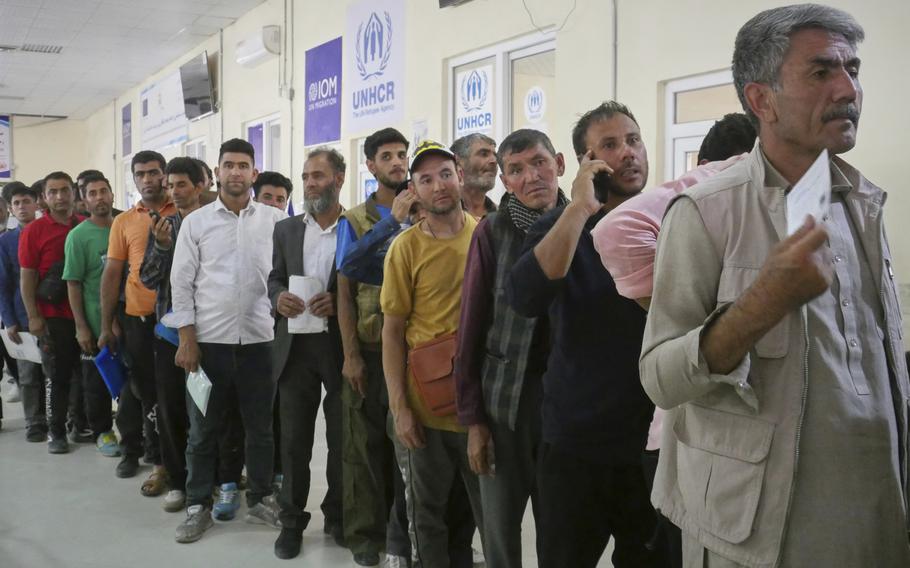
Afghan refugees who returned after fleeing Iran to escape deportation and conflict line up at a UNHCR facility near the Islam Qala crossing in western Herat province, Afghanistan, June 20, 2025. (Omid Haqjoo/AP)
Thousands of Afghans in the U.S. are no longer protected from deportation after a federal appeals court refused to postpone the Trump administration’s decision to end their legal status.
A three-judge panel of the Fourth U.S. Circuit Court of Appeals in Virginia said in a ruling late Monday there was “insufficient evidence to warrant the extraordinary remedy of a postponement” of the administration’s decision not to extend Temporary Protected Status for people from Afghanistan and Cameroon.
TPS for Afghans ended July 14, but was briefly extended by the appeals court through July 21 while it considered an emergency request for a longer postponement.
The Department of Homeland Security in May said it was ending Temporary Protected Status for 11,700 people from Afghanistan in 60 days. That status — in place since 2022 — had allowed them to work and meant the government couldn’t deport them.
CASA, a nonprofit immigrant advocacy group, sued the administration over the TPS revocation for Afghans as well as for people from Cameroon, which expire August 4. It said the decisions were racially motivated and failed to follow a process laid out by Congress.
A federal judge allowed the lawsuit to go forward but didn’t grant CASA’s request to keep the protections in place while the lawsuit plays out.
A phone message for CASA on Tuesday was not immediately returned. Without an extension, TPS holders from Afghanistan and Cameroon face a “devastating choice - abandoning their homes, relinquishing their employment, and uprooting their lives to return to a country where they face the threat of severe physical harm or even death, or remaining in the United States in a state of legal uncertainty while they wait for other immigration processes to play out,” CASA warned in court documents.
In its decision on Monday, the appeals court said CASA had made a “plausible” legal claim against the administration, and urged the lower court to move the case forward expeditiously.
It also said many of the TPS holders from the two countries may be eligible for other legal protections that remain available to them.
Temporary Protected Status can be granted by the Homeland Security secretary to people who face safety concerns in their home countries because of armed conflict, environmental disaster or other conditions. They can’t be deported and can work legally in the U.S., but they don’t have a pathway to citizenship.
The status, however, is inherently precarious because it is up to the Homeland Security secretary to renew the protections regularly — usually every 18 months. The Trump administration has pushed to remove Temporary Protected Status from people from seven countries, with Venezuela and Haiti making up the biggest chunk of the hundreds of thousands of people affected.
Homeland Security officials said in their decision to end the Temporary Protected Status for Afghans that the situation in their home country was getting better.
Groups that help Afghan TPS holders say the country is still extremely dangerous.
“Ending TPS does not align with the reality of circumstances on the ground in Afghanistan,” Global Refuge President and CEO Krish O’Mara Vignarajah said in a statement. “Conditions remain dire, especially for allies who supported the U.S. mission, as well as women, girls, religious minorities, and ethnic groups targeted by the Taliban.”
He called on Congress to provide Afghan TPS holders with a “permanent path to safety and stability.”